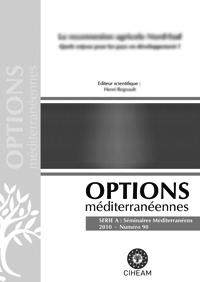| Article précédent | p. 133-138 | Article suivant |
No-tillage technology: Research review of impacts on soil quality and wheat production in semiarid Morocco
Morocco, an agriculture-dependent country, is facing various challenges: soil deterioration, productivity decline, and structural drought. The main causes of these threats are unnecessary tillage and over-grazing. In fact, these practices have induced desertification and a recession of the harmony between soils and crops. Hence, it is of paramount importance to revitalise this harmony and reverse this decline in order to encourage a transition towards sustainable agricultural development. This paper aims at providing up-to-date information on various impacts of no-tillage (NT) technology on soil and crop attributes from on-going long-term experiments. Two decades of research have shown improved yielding of wheat without need of tillage and seedbed preparation. NT was also found to positively affect and hence ameliorate soil quality, particularly soil organic matter, aggregation, water and nutrient availability.
- [ Afficher ]
- [ Télécharger ]
- [ Exporter la citation ]
Vous pouvez télécharger la citation au format :
- [ Imprimer ]
-
Mots-clés
BLE, DURABILITE, NON TRAVAIL DU SOL, QUALITE, SOLCiter cet article
Mrabet R., El Brahli A., Anibat I., Bessam F. No-tillage technology: Research review of impacts on soil quality and wheat production in semiarid Morocco. In : Cantero-Martínez C. (ed.), Gabiña D. (ed.). Mediterranean rainfed agriculture: Strategies for sustainability . Zaragoza : CIHEAM, 2004. p. 133-138. (Options Méditerranéennes : Série A. Séminaires Méditerranéens; n. 60). Final Seminar of the Regional Action Programme on Rainfed Agriculture (RAP-RAG), 2003/06/02-03, Zaragoza (Spain). http://om.ciheam.org/om/pdf/a60/04600053.pdf



